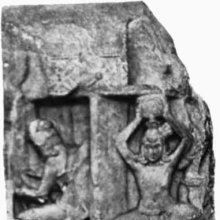Suruci Jataka, Suruci-jātaka: 1 definition
Introduction:
Suruci Jataka means something in Buddhism, Pali. If you want to know the exact meaning, history, etymology or English translation of this term then check out the descriptions on this page. Add your comment or reference to a book if you want to contribute to this summary article.
Images (photo gallery)
In Buddhism
Theravada (major branch of Buddhism)
Source: Pali Kanon: Pali Proper NamesThere once reigned in Mithila a king, named Suruci. He had a son also called Suruci kumara, who studied at Takkasila, where Prince Brahmadatta of Benares was his fellow student. They became great friends, and agreed to bring about an alliance between the two royal houses. Suruci came to the throne of Mithila and had a son called after himself. Brahmadatta became king of Benares and had a daughter, Sumedha. A marriage was arranged between Suruci and Sumedha, but Brahmadatta agreed to the alliance only on condition that Sumedha should be Surucis only wife. Suruci accepted this condition, but, though Sumedha lived in the palace for ten thousand years, she had no child. The people clamoured for an heir, but Suruci refused to take another queen, though Sumedha herself obtained for him many thousands of women for his harem, sixteen thousand in all. Forty thousand years thus passed, but no child was born in the palace.
Then Sumedha vowed an Act of Truth; Sakkas throne was heated, and he asked the god Nalakara to be born as Sumedhas son. Nalakara reluctantly agreed. Then Sakka went to the kings park disguised as a sage and offered to give any woman who was virtuous a son. If thou seek virtue, seek Sumedha, they said. He then went to the palace, and having made Sumedha declare to him her virtue, he revealed his identity and promised her a son. In due course a son was born - Mahapanada. He grew up amid great splendour, and, when he was sixteen, the king built for him a grand palace.
It is said that Sakka sent Vissakamma as mason to help with the building. When the palace was completed, three ceremonies were held on the same day: the dedication of the palace, Mahapanadas coronation and his marriage. The festival lasted for seven years, and the people began to grumble; but the king would not bring the festival to an end, for all this time Mahapanada had not once laughed, and the king said the feast could not end till he was made to laugh. Various people came to amuse him, among them two jugglers, Bhandukanna and Pandukanna; but it was not till Sakka sent a divine dancer to dance the Half body dance, in which one half of the body danced while the rest stood still, that Mahapanada smiled.
The story was related on the occasion on which the Buddha gave Visakha eight boons. One night there was a great storm, and the Buddha asked the monks to drench themselves in the rain as that would be the last great rain storm in his time. Together with them the Buddha appeared at Visakhas house, but as soon as they arrived on the threshold they were quite dry.
Bhaddaji is identified with Mahapanada, Visakha with Sumedha, Ananda with Vissakamma, and the Bodhisatta, was Sakka. J.iv.314-25; cf. DA.iii.856f.; and J.ii.334.
Theravāda is a major branch of Buddhism having the the Pali canon (tipitaka) as their canonical literature, which includes the vinaya-pitaka (monastic rules), the sutta-pitaka (Buddhist sermons) and the abhidhamma-pitaka (philosophy and psychology).
See also (Relevant definitions)
Partial matches: Jataka, Suruci.
Full-text: Suruci, Mahapanada, Videha, Bhaddaji, Vissakamma.
Relevant text
Search found 5 books and stories containing Suruci Jataka, Suruci-jātaka; (plurals include: Suruci Jatakas, jātakas). You can also click to the full overview containing English textual excerpts. Below are direct links for the most relevant articles:
Amaravati Art in the Context of Andhra Archaeology (by Sreyashi Ray chowdhuri)
Suruci Jātaka < [Chapter 3 - Amarāvatī and the Formative Stage of the Buddhist Art]
Formal Education System in Ancient India (by Sushmita Nath)
The Takṣaśilā centre of learning < [Chapter 3 - Centres of Learning in Vedic and Buddhist Period]
The Great Chronicle of Buddhas (by Ven. Mingun Sayadaw)
Aṭṭhanga Uposatha Sīla (The Eight-Precept Observance) < [Chapter 6 - On Pāramitā]
The Jataka tales [English], Volume 1-6 (by Robert Chalmers)
Jataka 489: Suruci-jātaka < [Volume 4]
Settlement in Early Historic Ganga Plain (by Chirantani Das)
Part 16 - Vārāṇasī from proto historic to historic context < [Chapter VI - Vārāṇasī: Emergence of the Urban Centre and Seat of Administration]
